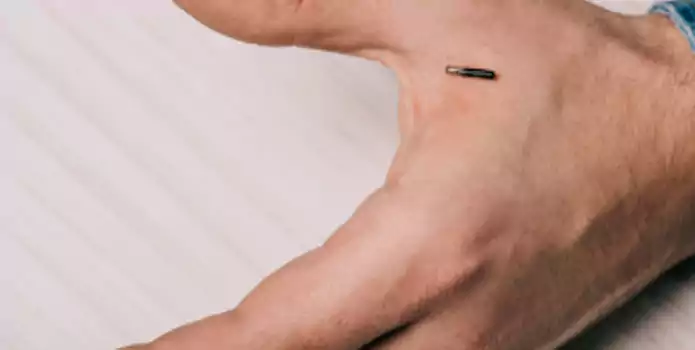When it comes to microchip implants, our minds immediately stray to science fiction tales and dystopian fantasy lands – however, the reality is a little more complex than this. Indeed, it’s actually likely that you will see microchip implants at some point in your lifetime. They’re becoming more than just the thing of science fiction and a tech-geek obsession. In fact, these microchip implants could well be the future of many aspects of life, including medical care, spending, identification, and more.
And for the sceptics out there – now might be the time to begin revising your position, because it’s possible that the number of reasons to argue these nifty little technologies is falling. So, with that in mind, let’s take a look at what microchip implants are and why it is likely that these technologies will soon be playing a more significant role in how we live our lives.
Microchip Technology isn’t New!
You might be surprised to learn that microchip technology actually isn’t an entirely new phenomenon. In fact, as soon as 2017, there were already thousands of people in Sweden who had undergone the minor procedure to get their own microchip implanted.
However, far from the stuff of science fiction, these new microchips were relatively more simple. Sure, they allowed the user to unlock their car door or make a payment with a wave of a hand. Still, with that being said, they weren’t exactly game-changing pieces of technology, and it’s crucial to be aware of this.
Making Improvements to Microchip Technology
To this end, McMullan – a veteran of the tech industry with a career spanning over two decades – put his mind to finding a functional use for microchip technology that was more than just for a novelty. And indeed, he achieved this; surprisingly, his practical use was for more than just personal ease too.
In fact, McMullan’s revolutionized microchip technology was used to allow workers access to their computers, immediately providing a boost to security protocols. What’s more, the microchips had also been tailored so that they’d only allow this if the person had personally opened the door that day. In short, this new microchip technology provided a double boost to premises security. And this is potentially where a lot of the future opportunities for microchip implant technologies could lie.
Applications for Microchip Technology
So, we’ve clarified that microchip technology could potentially be useful for more than just a novelty item. But what are some of these potential uses? Well, we’ve considered a few different options that could be represented by microchip technology as follows. And, from these options, it’s becoming increasingly apparent that microchip opposers may soon need to begin rethinking their stance because this actually offers a surprising number of highly practical applications.
Microchips in Healthcare Fields
To begin with, let’s take a look at the potential benefits of microchip technology in the field of healthcare. This is an important point to consider since some of the most prominent arguments against microchip technology people provide are for health reasons. Not only are microchips made from non-allergenic materials, but studies have also found no obvious link between microchip usage and medical consequences.
In fact, one particular study even identified that microchip technology may have helped to reduce the incidence of cancerous tumor growth. As such, it’s clear to see that there are potential health benefits of using microchip technology – and that means that microchips could be a very likely addition to modern healthcare and symptom diagnosis.
McMullan also had a personal interest with microchips for the healthcare field. Indeed, an accident that occurred over a decade ago with his wife led to her suffering from a chronic nerve disorder. This causes here severe pain, and in order to manage this, she’s had to have a spinal cord simulator implanted to help with this. Indeed, technologies such as this spinal cord simulator quite literally saved her quality of life. To this end, the potential for microchip technology in the healthcare field could be great.
Furthermore, it’s also possible that microchip technology and the like could be influential in other aspects of healthcare. And, with technology being increasingly used in medicine (such as with nerve stimulators, artificial joints, implantable birth-control devices, and the like) there are evidently ample opportunities for the implementation of microchips in the modern world.
Concerns Regarding GPS Tracking
Potentially, GPS tracking could offer a huge number of benefits for the world. Indeed, this could make it possible for people who had gone missing to be found rapidly and easily. Furthermore, mandatory use of microchip technology could ensure that all individuals present at a location during crimes could be identified for a question. In turn, this could have a highly beneficial effect on reducing crime rates, potentially even eliminating crime itself so long as the individuals had their tracking chips functional.
However, although GPS tracking could offer numerous benefits for safety and reducing crime rates, there are many concerns about GPS tracking and microchip technology in general. Indeed, this is well explained by Luis Martinez, a specialist in preventative medicine for San Juan. Martinez also worked closely with McMullan during the development of chips.
He explains, “There’s an interest but also a controversy with the actual GPS tracking. A lot of parents will feel actually safe if they can track real-time where their children are, given abductions, child trafficking, and all that. Other populations … are being looked at for different reasons: law enforcement, or say you could use a GPS chip to identify registered sex offenders. I think it’ll be a case-by-case basis where different countries or different societies will decide.”
Final Thoughts
Microchip technology is no longer the thing of science fiction, and it can offer numerous potential benefits for your lifestyle. However, irrelevant of whether you support microchip technology or not, the security and healthcare/health monitoring benefits likely mean that microchips may be on their way regardless. So, for sceptics, now could well be the time to rethink the stance; indeed, it’s quite likely that laws will soon change, whether or not people are ready for it!


